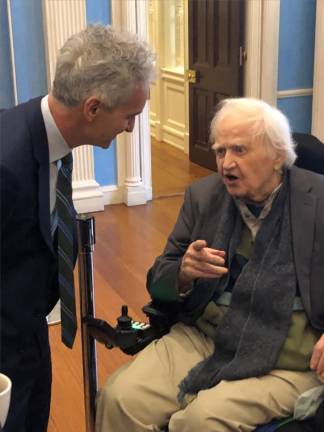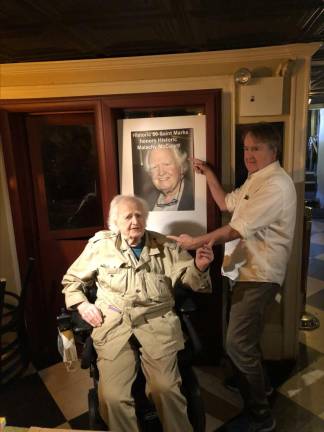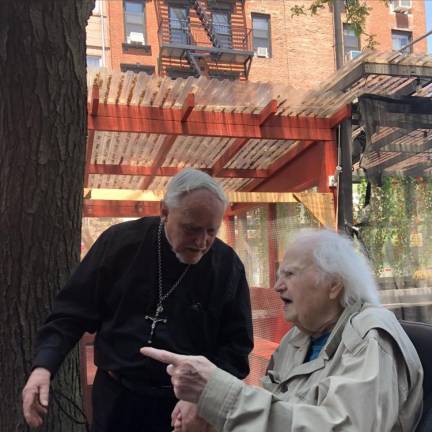Farewell to Malachy McCourt, The Last of the McCourt Brothers Passes at 92
He was truly a raconteur and an outspoken critic of pomposity since arriving in America, running a few saloons, writing a bestselling memoir, “A Monk Swimming,” starring in plays, in soap operas and in movies. Last year, he was admitted into hospice but was kicked out when he did not die. We ran what is believed to be his last bylined article ever under the headline “Malachy McCourt: Made It to Another St. Patrick’s Day! and Expounds on the Patron Saint Who Isn’t Really a Saint.” But his luck finally ran out this year. He died on March 11 at age 92.



We were fortunate to have had Malachy McCourt in our lives for as long as we did. We will truly never see the likes of him again. At Straus News, just over a year ago, we ran what is probably his last bylined piece under the headline: “Malachy McCourt: Made it to Another St. Patrick’s Day and Expounds on the Patron Saint Who Isn’t Really a Saint.”
But on March 11, the last of the original McCourts passed away a few days short of another St. Patrick’s Day at the age of 92.
He had a tough life in Ireland. Three of his siblings never made it out of childhood. Though born in Brooklyn, the family re-emigrated to Ireland when he was a youngster and he grew up poor in Limerick City, with his mother Angela raising the surving four children after his alcoholic father abandoned them.
He arrived in New York at the age of 20 with a bit of money sent to him by his older brother Frank, who years later would go on to win a Pulitzer Prize for his memoir, “Angela’s Ashes.” They wrote and starred in the play, “A Couple of Blaguards.” And after Frank’s book, “Angela’s Ashes” started its amazing climb up the bestseller lists, Malachy McCourt also wrote a memoir of his own about the family’s hard scrabble life called “A Monk Swimming.” For awhile they were both on the best seller lists simultaneously.
”Nobody does poor better than Malachy,” said John McDonagh, who for years co-hosted an Irish program on WBAI 99.5 FM entitled, “Radio Free Eirean.” When people on the show would talk about their own tough upbringing, McDonagh recalled McCourt’s frequent question was: “You were poor? Did you have indoor plumbing.” When most of the guests kind of fumbled around and admitted that they did indeed have a toilet inside the house, McCourt would counter, “You weren’t poor!”
McDonagh penned an obit for the Irish Star in which he recalled that he first heard McCourt’s on the radio growing up in Queens when his own Donegal-born mother would tune in every week, even though she disagreed with most of his positions on everything from Ireland to McCourt’s stance against the Vietnam War. “I first heard Malachy on the radio in 1972...he became a friend for 40 years,” McDonagh wrote.
McCourt had several bars in New York, including one eponymously named hot spot called “Malachy’s” on Third Ave. The famed Barbizon Hotel, reserved exclusive for women was nearby and the young women from the hotel that housed up and coming stars, stewardesses and the like would frequently stop into the bar. McCourt claims Malachy’s effectively became the city’s first singles bar. Alas, it was backed by another owner who ended up firing the bar’s namesake after too many absences from long nights out. McCourt also owned the Bell’s of Hell in Greenwich Village and a later bar on St. Mark’s Place.
We ran a charity fundraiser called the Kelly Gang at Michael’s Restaurant around St. Patrick’s Day every year with Police Commissioner Ray Kelly, novelist Tom Kelly, and publishing executives Ed Kelly, Mike Kelly and others. In the last one in 2019 before COVID derailed the gathering, McCourt was still mobile enough to drop in and teamed up with my brother Kirk Kelly to sing, “The Parting Glass” at the end of the night. Although his signature song seemed to be “Will Ye Go Lassie Go,” which I last heard him sing as people were making a last ditch effort in the summer of 2022 to save Lorcan Otway’s Theatre 80 on St. Mark’s Place.
Among McCourt’s other memoirs, were “Singing My Him Song,” and appropriately, “Death Need Not be Fatal.” Shortly after arriving in the United States at age 20, he seemed to hit his stride in the acting world, starring as Kevin MacGuinness from 1975 to 1980 on the soap opera “Ryan’s Hope” and also had a recurring role as Father Clarence, making a Christmas appearance for years on “All My Children.” He also made appearances in “One Life to Live” and “Search for Tomorrow.” His movie credits included the award winning 1990 film “The Field,” “The Brinks Job,” and “The Molly Maguires.” He once played a Catholic priest in the HBO series “Oz,” although if you asked him his religion he was often apt to reply, “I’m an atheist, thank God!”
When Niall O’Dowd and Patricia Harty, the publisher and editor, respectively, of Irish America Magazine awarded President Bill Clinton the Irishman of the Year in 1996, the crowd was growing restless. “President Clinton was late,” recalled Harty, “and Malachy took to the stage and kept everybody entertained as we waited and waited.”
“He was always larger than life and outrageous and so very funny and found humor where often there was none,” Harty recalled.
As he battled a lot of physical ailments that kept him confined to a wheel chair the past few years, his mind and his humor were as sharp as ever. Harty recalled he joked about his health, noting that he was “in the departure lounge.”
McCourt’s passing earned obituaries in both SoapCentral and The New York Times and he was eulogized by folk rocker Joe Hurley at the 26th annual All Star Irish Revue on March 15. McCourt was a frequent performer and friend of Hurley over the years.
McCourt is survived by his daughter Siobhan, sons Malachy Jr., Conor, and Cormac, his stepdaughter Nina Galin, and his wife Diana.
“While this is certainly a sad moment for our community–a community he helped build–we should also keep in mind what a blessing it was to know him and to share this world with him,” wrote the Irish American Artists and Writers, as they broke the news to their members.
And perhaps no words are more fitting than his classic song “Will Ye Go Lassie Go.”
“Oh, the summer time is coming,
And the trees are sweetly blooming,
And the wild mountain thyme
Grows around the blooming heather.
Will ye go, lassie go?”
Patricia Harty found herself harkening back to the lyrics to the ‘Bells of Hell,” the song that inspired his long ago pub in Greenwich Village, where future Black 47 front man Larry Kirwan and others got their start playing in the back room.
“The Bells of Hell Go Ting-a-ling-a-ling for me but not for you...If you meet the undertaker or the young man from the Pru/Get a pint with what’s left over/And I’ll say goodbye to you.”